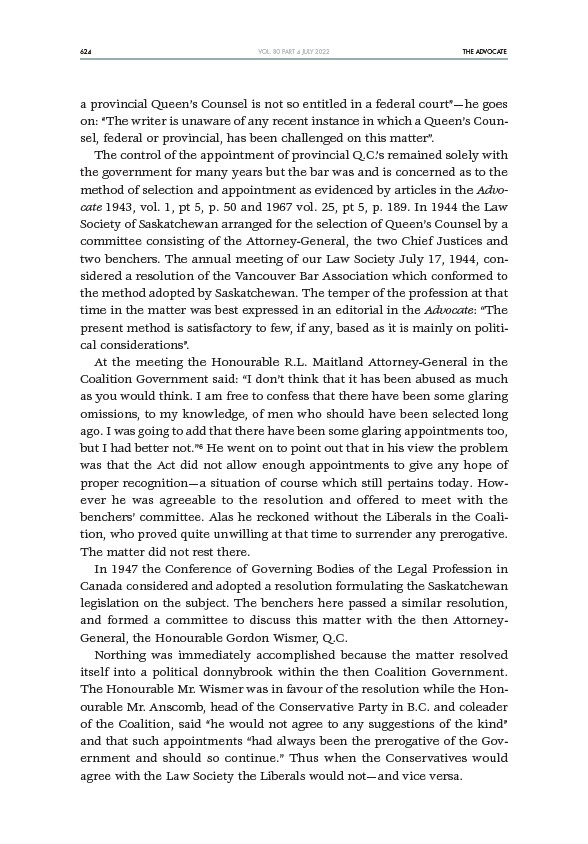
624 THE ADVOCATE
VOL. 80 PART 4 JULY 2022
a provincial Queen’s Counsel is not so entitled in a federal court”—he goes
on: “The writer is unaware of any recent instance in which a Queen’s Counsel,
federal or provincial, has been challenged on this matter”.
The control of the appointment of provincial Q.C.’s remained solely with
the government for many years but the bar was and is concerned as to the
method of selection and appointment as evidenced by articles in the Advocate
1943, vol. 1, pt 5, p. 50 and 1967 vol. 25, pt 5, p. 189. In 1944 the Law
Society of Saskatchewan arranged for the selection of Queen’s Counsel by a
committee consisting of the Attorney-General, the two Chief Justices and
two benchers. The annual meeting of our Law Society July 17, 1944, considered
a resolution of the Vancouver Bar Association which conformed to
the method adopted by Saskatchewan. The temper of the profession at that
time in the matter was best expressed in an editorial in the Advocate: “The
present method is satisfactory to few, if any, based as it is mainly on political
considerations”.
At the meeting the Honourable R.L. Maitland Attorney-General in the
Coalition Government said: “I don’t think that it has been abused as much
as you would think. I am free to confess that there have been some glaring
omissions, to my knowledge, of men who should have been selected long
ago. I was going to add that there have been some glaring appointments too,
but I had better not.”6 He went on to point out that in his view the problem
was that the Act did not allow enough appointments to give any hope of
proper recognition—a situation of course which still pertains today. However
he was agreeable to the resolution and offered to meet with the
benchers’ committee. Alas he reckoned without the Liberals in the Coalition,
who proved quite unwilling at that time to surrender any prerogative.
The matter did not rest there.
In 1947 the Conference of Governing Bodies of the Legal Profession in
Canada considered and adopted a resolution formulating the Saskatchewan
legislation on the subject. The benchers here passed a similar resolution,
and formed a committee to discuss this matter with the then Attorney-
General, the Honourable Gordon Wismer, Q.C.
Northing was immediately accomplished because the matter resolved
itself into a political donnybrook within the then Coalition Government.
The Honourable Mr. Wismer was in favour of the resolution while the Honourable
Mr. Anscomb, head of the Conservative Party in B.C. and coleader
of the Coalition, said “he would not agree to any suggestions of the kind”
and that such appointments “had always been the prerogative of the Government
and should so continue.” Thus when the Conservatives would
agree with the Law Society the Liberals would not—and vice versa.